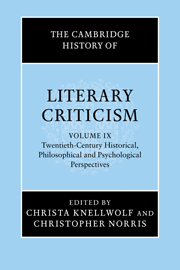Book contents
- Frontmatter
- Introduction
- HISTORY
- MARXISM AND POST-MARXISM
- FROM CULTURAL POETICS TO CULTURAL STUDIES
- 11 Mikhail Bakhtin: historical becoming in language, literature and culture
- 12 Cultural studies
- 13 Literature and the institutional context in Britain
- PSYCHOANALYTIC APPROACHES
- GENDER AND SEXUALITY
- COLONIALISM, POST-COLONIALITY, NATION AND RACE
- MODERNITY AND POSTMODERNISM
- PHILOSOPHY, AESTHETICS AND LITERARY CRITICISM
- INTERDISCIPLINARY APPROACHES
- Bibliography
- Index
- References
11 - Mikhail Bakhtin: historical becoming in language, literature and culture
from FROM CULTURAL POETICS TO CULTURAL STUDIES
Published online by Cambridge University Press: 28 March 2008
- Frontmatter
- Introduction
- HISTORY
- MARXISM AND POST-MARXISM
- FROM CULTURAL POETICS TO CULTURAL STUDIES
- 11 Mikhail Bakhtin: historical becoming in language, literature and culture
- 12 Cultural studies
- 13 Literature and the institutional context in Britain
- PSYCHOANALYTIC APPROACHES
- GENDER AND SEXUALITY
- COLONIALISM, POST-COLONIALITY, NATION AND RACE
- MODERNITY AND POSTMODERNISM
- PHILOSOPHY, AESTHETICS AND LITERARY CRITICISM
- INTERDISCIPLINARY APPROACHES
- Bibliography
- Index
- References
Summary
Mikhail Bakhtin wrote at length about the history of the novel and its roots in popular-festive culture, and his historical writing is often celebrated for its extraordinary erudition and breadth of reference. Nevertheless it often conveys the impression that history is simply a canvas on which Bakhtin is painting philosophical, political and maybe even religious pictures. This is partly due to the wild historical generalisations one finds throughout Bakhtin's works, generalisations for which Bakhtin scholars have always had to invent unconvincing excuses, but is more a matter of the aggressive, partisan, almost celebratory tone of Bakhtin's literary-historical writing. For Bakhtin did not see literary history as a succession of events. He saw the passage of time as a mountainside down which flowed, with an initially erratic and faltering momentum, an ever deepening, ever more forceful current of historical ‘becoming’, which, by the time it struck bottom, had become a torrent sweeping all before it. History was the focus of his writing not in the sense of a discipline or a field of problems and concerns, but as the great achievement of modern European culture, to be protected and cherished by critical and philosophical thought.
From roughly the middle of the 1930s until his death in 1975, Bakhtin argued that the European novel was the purest cultural embodiment of this historical becoming, and that, consequently, the theory of the novel was an act of supreme historical self-consciousness. In the many essays and notes he dedicated to the history and theory of this genre, he insisted on both its uniqueness and its centrality to the modern age. The novel was not just ‘another’ genre.
- Type
- Chapter
- Information
- The Cambridge History of Literary Criticism , pp. 143 - 154Publisher: Cambridge University PressPrint publication year: 2001

